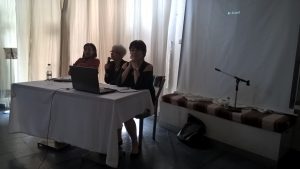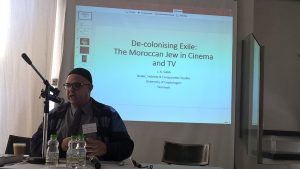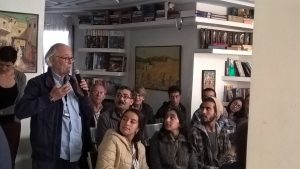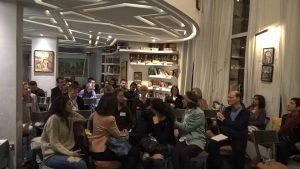The third day of the TMC conference started misty and atmospherically, with limited views outside the windows but all the more insightful views inside the conference room. Bright and early (for some at least), today got underway with a four-speaker panel on sexualities and trauma: we heard from Lowry Martin, Valerie Orlando, Kaya Davies Hayon and Jimia Boutouba.

Lowry started the panel with a queer studies approach to Salvation Army (Abdallah Taïa), which was met with very lively discussions: where is queer studies situated when we talk about Moroccan cinema, or cinema from Morocco that crosses borders (in this case between Morocco and Switzerland)? Do we need to make distinctions between a Muslim Arab world and a Christian Europe? Valerie talked about Mohamed Mouftakir’s film Pegase, a dark psychological thriller about a traumatised young woman who is the victim of her father’s lust for power and goes through life as a boy in order to safeguard his lineage. Her sexuality is denied, and as she undergoes psychiatric treatment it transpires that she is also the victim of pedophilia. The paper sparked questions about deviant sexualities and how film deals with silences and gaps in Morocco’s past. Kaya then looked at The Sleeping Child by Yasmine Kassari, in a phenomenological analysis of women’s bodies and the empowerment of spiritualism. A story about migration, where women are left behind, The Sleeping Child ultimately reveals a transnational feminist aesthetic that returns also in other Maghrebi women’s films. Jimia, lastly, changed the mood in the room as the sun came out, with a discussion of comedy Number One by Zakia Tahiri. The contextualization of the film nevertheless showed that a Moroccan masculinity is experienced as being under threat, and that ultimately this masculinity is a performance. The male protagonist in the film becomes undone, not in the sense that he is un-manned, but he is un-mastered. This comic film has social concerns that are just as urgent and important as the more serious films discussed earlier.

The roundtable on Berber film and film festivals that followed was organized by Lucy McNair and Habiba Boumlik from CUNY, who invited Hamid Aïdouni, Jamal Bahmad, the organisers of the Fameck Arab film festival, and Amazigh filmmaker Ahmed Baidou (known for his film Addour) onto the panel. They discussed issues of programming Amazigh films for festivals and issues of translating cultures as well as languages. Important questions were asked, such as: what is Amazigh cinema, and where is it located? Which language is Amazigh cinema in, and how does it speak to audiences around the world? We learned that one must think of Amazigh culture as a horizontal and as a vertical experience: in the past it reached from the Maghreb to Egypt, and from north of Morocco to its deep south. The most significant and welcome conclusion of this roundtable was that as scholars, filmmakers, producers, and distributors, we must all embrace the diversity within Morocco and within its cinema, and that it is very urgent to do so indeed.

The last panel of the day returned to the theme of women in film, discussing in particular the circulation of films, and their distribution circuits in Morocco, France and the EU at large. Patricia Caillé and Karine Prévoteau showed us their findings of years of research into why some films manage to reach wide audiences and others disappear into forgetfulness, as they get lost in the maze of film, DVD, VHS and TV distribution worldwide. Pertinent questions about online platforms and digital disruption were asked in their discussion. Touria Khannous closed off today by discussing Rock the Casbah (Leila Marrakchi) and The Sleeping Child (Yasmine Kassari), and in particular the difficult if not impossible balance of being an outsider and an insider at the same time. Might that be the ultimate transnational condition?
The highlight at the festival today was the screening of Oliver Lax’s Mimosas: a transnational production between Spain, France, Qatar and Morocco that combines elements of the road movie and the western. There were long queues to get into the cinema, which was filled to capacity. People clearly enjoyed themselves, and the Moroccan audiences may have gotten more out of the film than we did, as with certain scenes in the film, people were laughing at the nickname of the central character (tête de poêle), and we as Western audiences missed some of the jokes. Something got lost in translation, or cultural references were perhaps obscure for us. Such is the experience of a transnational spectator: it makes you wonder, explore and dig deeper…



